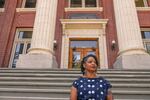
Recent decisions by the Greater Albany Public Schools Board have prompted community members to show both support and anger in comments and at GAPS meetings.
Jen Wright / KLCC
Last month, the Greater Albany School Board, with a majority of recently elected members, fired the district superintendent with no explanation. Former superintendent Melissa Goff told OPB that their actions speak against diversity and inclusion.
“We have been really focused on making sure we have a strong educational system for all of our kids and making sure they prepared for next steps,” Goff said, “and in order to do that, they need to be able to think critically and be exposed to multiple perspectives and grow from learning from other ways of thinking, but instead, what we are seeing both in the actions of this board and in the actions of other boards is that people who have been marginalized in the past are being pushed again to the edges.”
The board members who voted to fire Goff didn’t respond to requests for comment.
Concerns over focusing on equity and inclusion in schools have become a hot topic, and the idea of teaching something called “critical race theory” in grade-school classrooms is creating conflict all over the country.
Critical race theory refers to a way of approaching laws in the United States that deal with or are affected by racial factors.

Charise Cheney is the director of Black Studies and an associate professor of Indigenous, Race and Ethnic Studies at the University of Oregon.
Courtesy of Charise Cheney / KLCC
Charise Cheney is the director of Black Studies and the associate professor of Indigenous, Race and Ethnic Studies at the University of Oregon. She has taught CRT in law classes.
“It’s a intervention into legal studies that centers race as a formative kind of tenant of the creation of law in this country. So that phrasing, ‘critical race theory,’ is actually being misused because it is a very specific field within legal studies,” Cheney said.
The discussion around CRT, equity and diversity in schools is also affecting what children will return to this fall. And it’s become an issue in school board elections.
Rebekah Schneiter is a 7th grade language arts teacher and has been an educator for over 15 years. She served on the Central Linn School District board from 2017 to this year.
Schneiter previously ran uncontested, and as the 2021 elections neared, she expected a repeat. A few weeks into her campaign, she met opposition.
“It became really clear that it was being politicized,” Schneiter said. “And there was a group supporting these other people, which is obviously fine, but they definitely had an agenda, and that was critical race theory and comprehensive sex education.”
Schneiter had never heard of those terms until then, and found herself struggling to answer questions about her stance on both issues. But, she says, no one wanted to discuss them — they just wanted her to assert her position. In the end, Schneiter lost the election.

Rebekah Schneiter is a teacher in the Corvallis School District, and has worked in education for over 15 years.
Courtesy of Rebekah Schneiter
Schneiter is worried about how misinformation about teaching CRT is affecting communities.
“The easy job is to get people worked up and riled up about something that’s not true, like fear mongering, and that’s what’s really been happening with critical race theory,” Schneiter said. “It’s easy to get worked up and say things, and then you can just walk away from it, but you’ve just, like, imploded this bomb on a system and you’re leaving — the educators have to pick up the pieces.”
Some people worry that conversations about race will make students uncomfortable, but Cheney says students of color are already experiencing racism, and making a space for conversations can help everyone.
“To negate those experiences and try to protect white students from being introduced to a conversation about those experiences again speaks volumes about the privileging of whiteness and how whites in various spaces are not made to feel ever uncomfortable around their racial identity,” Cheney said.
Some school districts have taken steps towards equity and inclusion this year, including Eugene 4J, which hired a consulting firm to look into how their students and teachers are being affected by inequity and race in school.
But in Newberg, the school board recently banned all “political symbols” including Black Lives Matter and Pride flags. This could be in violation of state laws around equity in education.
With the governor’s recent announcement that masks are required indoors at K-12 schools, the battles at school board meetings are now turning to focus on COVID protocols as the delta variant brings more cases among school-aged children in Oregon.